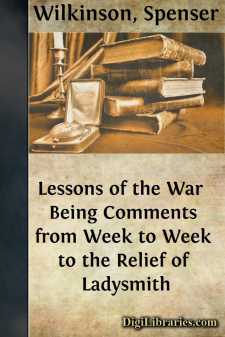Categories
- Antiques & Collectibles 13
- Architecture 36
- Art 48
- Bibles 22
- Biography & Autobiography 813
- Body, Mind & Spirit 142
- Business & Economics 28
- Children's Books 15
- Children's Fiction 12
- Computers 4
- Cooking 94
- Crafts & Hobbies 4
- Drama 346
- Education 46
- Family & Relationships 57
- Fiction 11828
- Games 19
- Gardening 17
- Health & Fitness 34
- History 1377
- House & Home 1
- Humor 147
- Juvenile Fiction 1873
- Juvenile Nonfiction 202
- Language Arts & Disciplines 88
- Law 16
- Literary Collections 686
- Literary Criticism 179
- Mathematics 13
- Medical 41
- Music 40
- Nature 179
- Non-Classifiable 1768
- Performing Arts 7
- Periodicals 1453
- Philosophy 64
- Photography 2
- Poetry 896
- Political Science 203
- Psychology 42
- Reference 154
- Religion 513
- Science 126
- Self-Help 84
- Social Science 81
- Sports & Recreation 34
- Study Aids 3
- Technology & Engineering 59
- Transportation 23
- Travel 463
- True Crime 29
Lessons of the War Being Comments from Week to Week to the Relief of Ladysmith
Description:
Excerpt
THE EVE OF WAR
The next six weeks will be an anxious time for the British Empire. The war which begins as I write between three and four on Wednesday afternoon, October 11th, 1899, is a conflict for supremacy in South Africa between the Boer States, their aiders and abettors, and the British Empire. In point of resources the British Empire is so incomparably stronger than the Boer States that there ought to be no possibility of doubt about the issue. But the Boer States with all their resources are actually in the theatre of war, which is, separated by the wide oceans from all the sources of British power, from Great Britain, from India, from the Australian and Canadian colonies. The reinforcements ordered on September 8th have not yet all arrived, though the last transports are due to arrive during the next four or five days. After that no further reinforcements can be expected for a month, so that during the next few weeks the whole strength of the Boers, so far as it is available at all, can be employed against a mere fragment of the British power. To the gravity of this situation it would be folly to shut our eyes. It contains the possibility of disaster, though what the consequences of disaster now would involve must for the present be left unsaid. Yet it may be well to say one word on the origin of the unpleasant situation which exists, in order to prevent needless misgivings in case the first news should not be as favourable as we all hope. There is no sign of any mistake or neglect in the military department of the Army. The quantity and character of the force required to bring the war to a successful issue has been most carefully estimated in advance; every preparation which forethought can suggest has been thought out, so that the moment the word was given by the supreme authority, the Cabinet, the mobilisation and despatch of the forces could begin and proceed without a hitch. The Army was never in better condition either as regards the zeal and skill of its officers from the highest to the lowest, the training and discipline of the men, or the organisation of all branches of the service. Nor is the present condition of the Army good merely by comparison with what it was twenty years ago. A very high standard has been attained, and those who have watched the Army continuously for many years feel confident that all ranks and all arms will do their duty. The present situation, in which the Boers start favourably handicapped for five weeks certain, is the foreseen consequence of the decision of the Cabinet to postpone the measures necessary for the defence of the British colonies and for attack upon the Boer States. This decision is not attributable to imperfect information. It was regarded as certain so long ago as December last, by those in a position to give the best forecast, that the Boers of both States meant war with the object of establishing Boer supremacy. The Cabinet, therefore, has knowingly and deliberately taken upon itself the responsibility for whatever risks are now run. In this deliberate decision of the Cabinet lies the best ground for hoping that the risks are not so great as they seem.
The two Boer Republics are well supplied with money, arms, and ammunition, and I believe have collected large stores of supplies. Their armies consist of their burghers, with a small nucleus of professional artillery, officers, and men. The total number of burghers of both States is about fifty thousand, and that number is swollen by the addition of non-British Uitlanders who have been induced to take arms by the offer of burghership. The two States are bound by treaty to stand or fall together, and the treaty gives the Commander-in-Chief of both armies to the Transvaal Commander-in-Chief, who is however, bound to consult his subordinate colleague of the Orange Free State....



